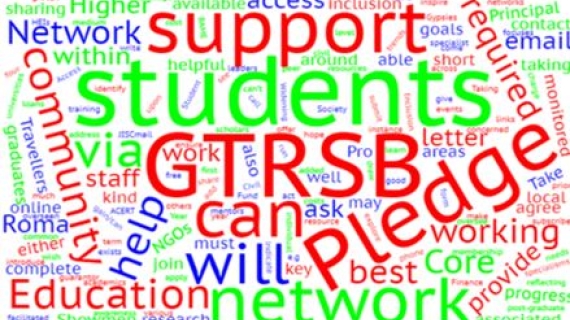
GTRSB into Higher Education Research
GTRSB into Higher Education Research
What does the research say?
Data from the Department of Education shows that from 2009–10 to 2017–18 for all other White groups, the trend in HE participation is upwards. However, for Travellers of Irish Heritage it has declined and for Gypsy/Roma groups it has remained static. (Atherton G. 2020) Overall it has been calculated that only 3-4 per cent of the Gypsy, Roma and Traveller populations aged 18-30 years access higher education compared with 43 per cent of 18-30 year-olds in the general population (Mulcahy et al. 2017; Greenfields, 2019).
Research evidence (Greenfields and Smith, forthcoming; Atherton, 2020; Forster and Gallagher, 2020; Mulcahy, et al, 2017) strongly evidences that even where they do proceed to post compulsory education, many students from the communities feel invisible, or unwelcomed in higher education institutions and are concerned about unconscious bias, lack of institutional knowledge about their status as ethnic groups, or fear exposure to racist stereotypes or tropes about their communities if they self-identify as such.

Moreover, abundant evidence exists that social exclusion across multiple domains experienced by GTRSB communities impacts both their wider life chances and the likelihood of access, retention and achievement in higher education. The House of Commons Women and Equalities Committee report (2019) “Tackling inequalities faced by Gypsy, Roma and Traveller communities” put it starkly when the Committee stated (2019:3) that: ‘Gypsy, Roma and Traveller people have the worst outcomes of any ethnic group across a huge range of areas, including education, health, employment, criminal justice and hate crime.’
Accordingly, to support members of the communities into and within HE, and to enable students from these groups to achieve their greatest potential, there is a clear need to understand and engage with diverse barriers to access and attainment.
To this end, in September 2019, Baroness Janet Whitaker, Co-Chair of the All Party Political Group on Gypsies, Roma and Travellers hosted a roundtable on the communities’ access to and experiences of Higher Education. The event took place at the House of Lords and brought together university representatives, Gypsy, Traveller, Roma, Showman and Boater (GTRSB) graduates and academics from the communities, educational policy bodies and NGOs working with community members who are, or who have been, higher education students. The report of the event and background briefing document can be accessed via the ‘Research, Policy and relevant publications’ page here.
Recommendations from the event included:
- The recognition that there is a need for greater understanding of the barriers and challenges facing GTRSB communities in relation to the higher education journey.
- That there is a need for HEIs (and the Further Education sector) to, collaborate more closely to support the educational journey of GTRSB students. Universities also need to work collaboratively with GTRSB civil society in a more coherent fashion to support GTRSB community members in transition into and through, academia.
- There is a need for HEIs to identify the most effective outreach routes, and recognise the different needs of the mature GTRSB student when compared to school leavers, as well as understanding what influences subject choice.
- That the views of NGOs and the communities need to be heard and listened to, and that a tailored approach must be taken to supporting communities at local and strategic level.
- Inclusion and social justice models of pedagogic practice emphasise that the higher education access agenda must engage with experiences as well as outcomes. To this end, co-production offers an ethical and effective route to increasing access to higher education for GTRSB community members.
Subsequent emergent issues impacting this stream of work include a recognition that:
- The impacts of Covid 19 will only exacerbate the challenges in supporting GRT learners to progress to HE, given that members of these communities were frequently educationally disadvantaged even prior to the pandemic. Emergent research suggests that young people from disadvantaged backgrounds will fall even further behind as a result of the enforced closure of schools and colleges (Adams, 2020), potentially reducing still further GTRSB engagement with non-compulsory education as a result of lack of sustained academic support and digital poverty (The Traveller Movement, 2020). Concerns have also been raised by some community members that alongside other BAME children, GTRSB young people may potentially be awarded lower than expected grades where teacher assessment are substituted for public exams, given the risk of unconscious bias or perceptions (The Equality Act Review, 2020).
Following on from the September 2019 Roundtable on GTRSB students into Higher Education and subsequent consultation with stakeholders, the ‘Pledge of Good Practice’ has been collaboratively developed, which engages with multiple streams of evidence on best practice in supporting GTRSB students.